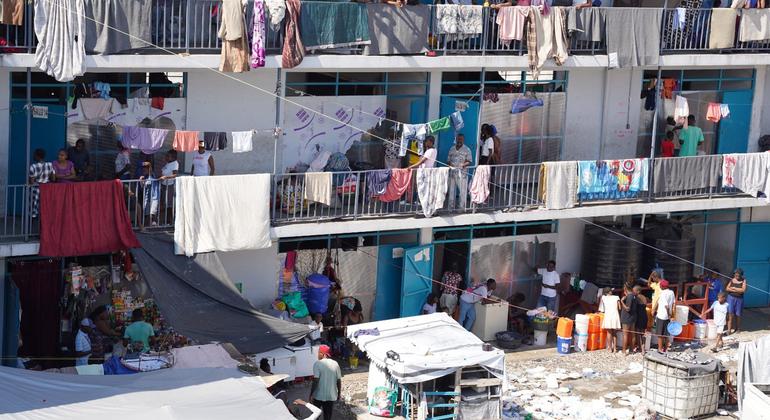New data from the International Organization for Migration indicates a 22 per cent spike in the number of people uprooted from their homes since June.
IOM said that gang violence had forced more than 110,000 people to flee their homes in the last seven months, particularly in Gressier, which lies west of the capital.
Grégoire Goodstein, IOM’s chief in Haiti, said that the sharp rise in displacement underscored the urgent need for a sustained humanitarian response from the international community.
Displaced multiple times
The UN agency noted that although more than 65,000 people had returned to the Cité Soleil neighbourhood near the capital, which is known for deadly clashes between rival gangs, these returnees “are often displaced again, following new attacks”.
As humanitarian needs grow, IOM has continued to provide critical assistance to displaced people and host communities, although access for aid teams remains difficult and dangerous in places.
IOM reaffirmed it would keep working alongside the Government of Haiti and international partners to provide lifesaving assistance and find long-term solutions for the displaced.
It is crucial that efforts to restore stability and security across the country continue, the agency said, alongside humanitarian aid to alleviate the immediate suffering.
Global immunisation coverage still below pre-pandemic levels
Global immunisation coverage has remained below pre-pandemic levels and the number of children who have not had a single vaccine has increased to 14.5 million.
That’s the worrying finding of an expert group of health advisers meeting at the UN World Health Organization (WHO), which said that more than half of these so-called “zero-dose” children live in 31 mostly-developing countries.
Many of these nations are fragile and conflict-affected, according to the Strategic Advisory Group of Experts on Immunization (SAGE), which blamed a dearth of political will and falling investment in immunisation programmes for the lack of success in reaching vulnerable youngsters.
New advice
The expert group also issued new vaccine advice to low- and middle-income countries where there’s a high burden of respiratory syncytial virus among children.
It’s a common virus that affects the nose, throat and lungs and a leading cause of hospitalisation of youngsters and the elderly.
“Clearly there is a major benefit to be expected and therefore we did give the recommendation that all countries should introduce either maternal vaccination or the monoclonal antibody to protect small children,” said Dr. Hanna Nohynek, Chair of SAGE.
She added that respiratory syncytial virus has surged since COVID-19 and now accounts for approximately one in three of those hospitalised with lower respiratory infections globally.
“Nearly all deaths from the virus happen in low and middle-income countries,” she confirmed.
Nearly 70 million across East Africa need humanitarian aid
New estimates from humanitarians in East Africa indicate that nearly 67 million people in the region are now in need of assistance.
“That is more than 20 per cent of the total number of people in need globally,” said UN Spokesperson Stéphane Dujarric, briefing reporters in New York on Wednesday.
The region is facing some of the world’s largest humanitarian crises, driven by climate change, conflict, political instability, economic shocks and disease outbreaks, he continued.
Marburg virus spreading
Measles and Mpox outbreaks continue with at least 776 Mpox cases reported in the region as of 26 September.
“The Marburg virus is now spreading. At least 29 cases have been confirmed in Rwanda, and that includes nine fatalities,” Mr. Dujarric said.
Most of the cases so far have been among health workers. Just under 300 contacts have been registered and are being followed up, said the Africa Centres for Disease Control and Prevention.
Marburg virus disease (MVD) is a severe and often fatal zoonotic haemorrhagic illness caused by the virus, which is usually transmitted to humans from fruit bats.
Human-to-human transmission occurs through direct contact with an infected person’s body fluids or with equipment and materials contaminated with infectious blood or tissues. There is currently no vaccine or specific treatment for MVD.
Mr. Dujarric said that the UN’s humanitarian partners continue to provide assistance to millions of people across East Africa.
“However, by the end of last month, only 38 per cent of the $9.3 billion required for humanitarian response efforts in East Africa this year was available, constraining our – and our partners’ – ability to scale up.”


